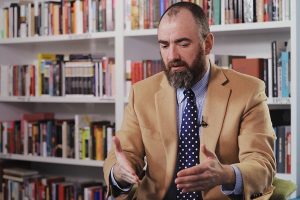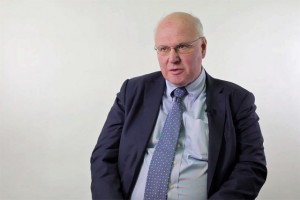Higher Education and Employability
David Dussault on the ideal type of students, gig economy and the difference between skills and knowledge
So if you’re a young person, you want to get an education, and it’s around about the year 1000, you have four options. You can go to a monastery: this is one of the most traditional options; you can become a monk. Maybe you’ll start as a very young person, maybe even as a baby, you begin in the monastery: it’s something that happens; babies are given to monasteries, and you grow up there, and you get a great education. That’s option number one.
Option number two: you can go to a court, maybe like a powerful household of a king or a bishop, and get an education there. Option number three: a cathedral school; this is the kind of institution that will morph into a university pretty soon. And then an apprenticeship: that’s your most practical kind of education, and that’s where you might learn to be a doctor or a lawyer or something like that.
In the monasteries, that monastic option is popular: there’s a steady trickle of young people and, as I said, babies who join monasteries around this period. It becomes more popular later. The kind of education that you get there may be very slow; you may be reading one text and really absorbing it over a period of a year or more, copying out the text and absorbing it as you go. Naturally, this education would be theological: you wouldn’t be learning medicine or law or poetry in the monasteries. You would be reading the Gospels, you’d be reading Scripture, you’d be reading commentaries on Scripture, you would become a theological expert.
At the courts, of course, there’s this practical dimension, too. So, in a royal court, you might get the kind of education – you might learn your letters at the royal court, so you might become literate in Latin, just enough to be functional, maybe as a diplomat. You might learn some poetry maybe, there’s a lot of poets who come through the courts, a lot of them vernacular poets, maybe speaking French or Occitan, but also Latin poets too, so you might learn some of that. You’ll probably also learn how to use a sword; you’ll probably also learn all kinds of these practical kinds of things, like how to ride a horse.
There are lots of cathedral schools that do exist. What happened there? Well, one account we have is by John of Salisbury, who is a wonderful writer from the mid-12th century. He remembers his time at cathedral school, and this is actually quite a physical education: he remembers the master beating them, beating ideas into them. But the thing he remembers most about this, and that’s why I think the beating is important, is it was a bodily experience: you imitated not just the ideas of the master but also their bodily comportment; you wanted to become like your masters at the cathedral school. In other words, at the cathedral schools, you learned not just ideas or read texts; you learned how to be the kind of person that your master was. It was a very holistic attitude to education.
And finally, apprenticeships: this is, in many ways, how we get the very first university that we call a university in Europe – Bologna, the law school. It really emerges out of these smaller schools where you get an apprenticeship practice going on.
Maybe I’m a lawyer, and you’re my apprentice, and you come and shadow me, and maybe now suddenly there are three of you who want to come and learn how to do notary, notarial work or small-scale legal practices. This is a kind of a small apprentices workshop, and that’s what blooms into something like the University of Bologna.
So what kind of career path does all of this lead to, these four options? Well, obviously, if you’re in a monastic school, you’ve kind of closed your career options down; you’re becoming a monk mostly, you can’t leave. Once you’ve joined a monastery, you’ve taken an oath, you’re part of the order, you obey the rules, and it’s really, really bad to leave. So you don’t join a monastery just to get an education and then skip off somewhere else. So, that career path is kind of closed.
At the courts, of course, you’ve got practical experience. You’ve been at a royal court or a bishop’s court, you’ve learned how to do some diplomatic work, you’ve learned a little bit of literacy, maybe a bit of poetry, and you’ve become a kind of useful character. You can maybe trade between different courts; maybe you start at one bishop’s court and then move to another, or maybe you trade up from a small aristocrat’s court to the king’s court or something like that. There is a career advancement option for you there.
For cathedral scholars, a lot of these guys are becoming canons: they’re monks, but they’re freer than monks, they can preach, they live in the world, and this is a wonderful career path. Of course, some of them will go into the priesthood, more regular priesthood, some of them will want to advance into other forms of life, I suppose some of them might choose to then join a royal court after being in a cathedral school, not unheard of; the diplomatic life beckons for some of these guys, they will be spreading across the continent of Europe. With their Latin language, which they’ve learned, they’re now useful in England, in Spain, in Italy and Germany, everywhere.
So that is an international passport really, getting this kind of literate Latin education.
And of course, for the apprentices, those who studied at a small notarial practice or maybe who studied medicine, it’s much more vocational, and of course, a lot of these apprenticeships will be for the crafts as well, for maybe practical arts, for cathedral building, for blacksmiths and things like that. These small apprenticeships have their own vocational career path, which is pretty well mapped out. It’s not likely that you would go and do a legal apprenticeship at this point and then go off and do some diplomatic work somewhere else. At this point, legal training is very, very targeted: it’s only later, really, that training in law can open up a whole life of careers for you.

David Dussault on the ideal type of students, gig economy and the difference between skills and knowledge

Historian Jay Winter on the global character of wars in the 20th century, the influence of technical progress ...

Historian Alexander Sidorov on the unique artifact of the Carolingian Renaissance — a mysterious statuette of ...